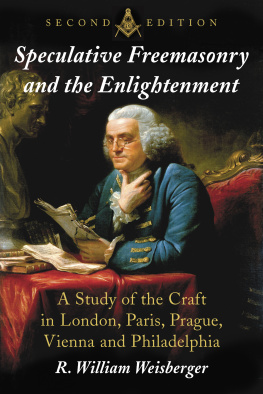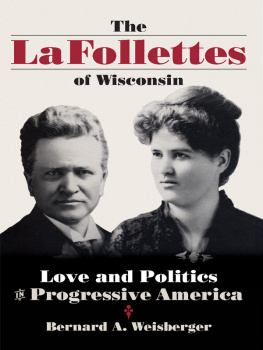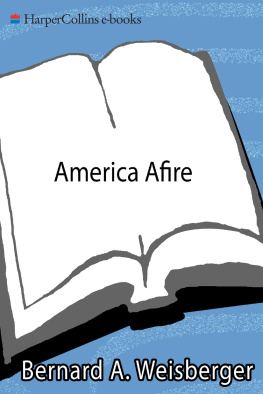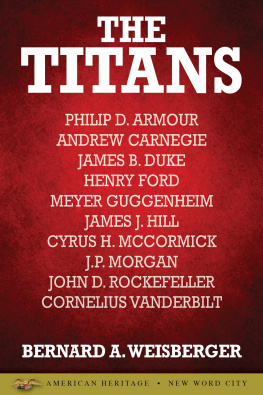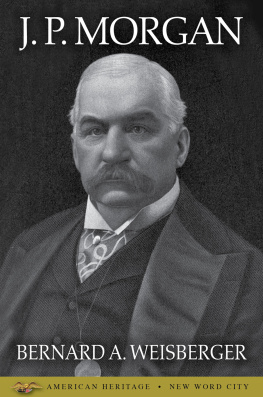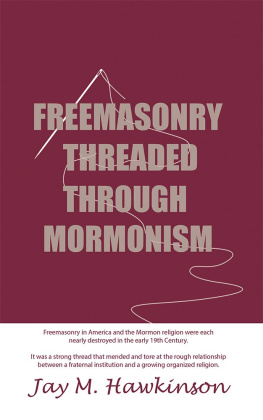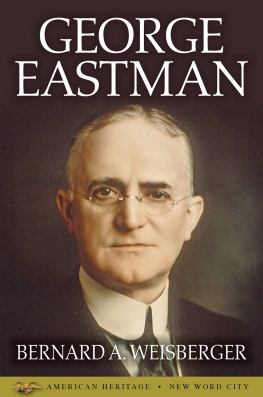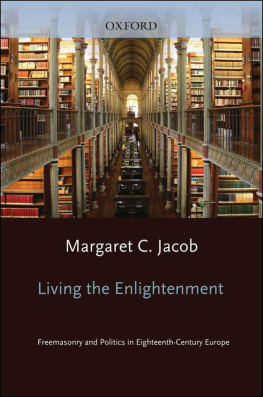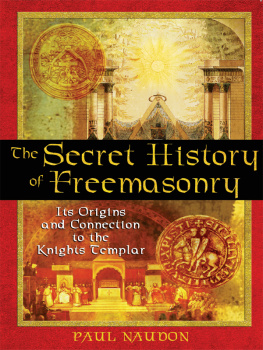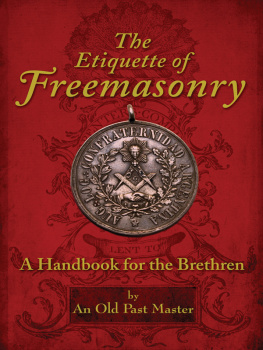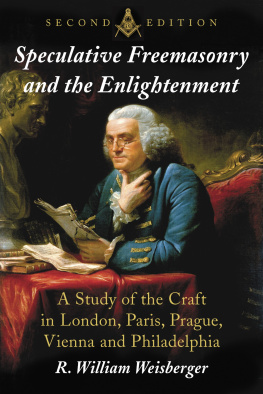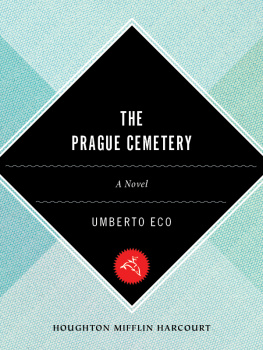Weisberger - Speculative Freemasonry and the Enlightenment: a study of the craftin London, Paris, Prague, Vienna and Philadelphia
Here you can read online Weisberger - Speculative Freemasonry and the Enlightenment: a study of the craftin London, Paris, Prague, Vienna and Philadelphia full text of the book (entire story) in english for free. Download pdf and epub, get meaning, cover and reviews about this ebook. City: Europe, year: 2017, publisher: McFarland & Co, genre: Religion. Description of the work, (preface) as well as reviews are available. Best literature library LitArk.com created for fans of good reading and offers a wide selection of genres:
Romance novel
Science fiction
Adventure
Detective
Science
History
Home and family
Prose
Art
Politics
Computer
Non-fiction
Religion
Business
Children
Humor
Choose a favorite category and find really read worthwhile books. Enjoy immersion in the world of imagination, feel the emotions of the characters or learn something new for yourself, make an fascinating discovery.
- Book:Speculative Freemasonry and the Enlightenment: a study of the craftin London, Paris, Prague, Vienna and Philadelphia
- Author:
- Publisher:McFarland & Co
- Genre:
- Year:2017
- City:Europe
- Rating:5 / 5
- Favourites:Add to favourites
- Your mark:
- 100
- 1
- 2
- 3
- 4
- 5
Speculative Freemasonry and the Enlightenment: a study of the craftin London, Paris, Prague, Vienna and Philadelphia: summary, description and annotation
We offer to read an annotation, description, summary or preface (depends on what the author of the book "Speculative Freemasonry and the Enlightenment: a study of the craftin London, Paris, Prague, Vienna and Philadelphia" wrote himself). If you haven't found the necessary information about the book — write in the comments, we will try to find it.
Weisberger: author's other books
Who wrote Speculative Freemasonry and the Enlightenment: a study of the craftin London, Paris, Prague, Vienna and Philadelphia? Find out the surname, the name of the author of the book and a list of all author's works by series.
Speculative Freemasonry and the Enlightenment: a study of the craftin London, Paris, Prague, Vienna and Philadelphia — read online for free the complete book (whole text) full work
Below is the text of the book, divided by pages. System saving the place of the last page read, allows you to conveniently read the book "Speculative Freemasonry and the Enlightenment: a study of the craftin London, Paris, Prague, Vienna and Philadelphia" online for free, without having to search again every time where you left off. Put a bookmark, and you can go to the page where you finished reading at any time.
Font size:
Interval:
Bookmark:

Second Edition
R. William Weisberger

McFarland & Company, Inc., Publishers
Jefferson, North Carolina
LIBRARY OF CONGRESS CATALOGUING DATA ARE AVAILABLE
BRITISH LIBRARY CATALOGUING DATA ARE AVAILABLE
e-ISBN: 978-1-4766-2969-8
2017 R. William Weisberger. All rights reserved
No part of this book may be reproduced or transmitted in any form or by any means, electronic or mechanical, including photocopying or recording, or by any information storage and retrieval system, without permission in writing from the publisher.
Front cover: Portrait of Benjamin Franklin in London by David Martin, oil on canvas, 40" x 50", 1767 (White House Historical Association)
McFarland & Company, Inc., Publishers
Box 611, Jefferson, North Carolina 28640
www.mcfarlandpub.com
For Patty, Carolyn, Lucile,
Alice, Sidney, and Phil
I especially am indebted to Dr. Seymour Drescher and Dr. Steven Vardy for their advice in the publication of this study. I also am indebted to the late Dr. James Clarke. Without assistance from other individuals, this work could not have been published. I wish to thank Dr. David Anderson of Butler County Community College, Keith Arrington of the Iowa Masonic Grand Lodge Library, and Roy Goodman of the American Philosophical Society. Librarians from Princeton, the University of Pennsylvania, and the University of Pittsburgh gave me invaluable assistance. The late Dr. Stephen Fischer-Galati, editor of the East European Monograph Series, was of great assistance.
Numerous individuals were involved with the second edition of this book. I wish to thank Nancy Tyson of Columbia University Presss East European Monograph Series for consenting to the publication by McFarland of the books second edition. She also allowed me to include, as Appendix 3, my Freemasonry as a Source of Jewish Civil Rights in Late Eighteenth-Century Vienna and Philadelphia: A Study in Atlantic History, East European Quarterly XXXIV, no. 4 (January 2001), 419445. Gratitude is also expressed to Diana L. Pesek of the Pennsylvania State University Journals. She allowed me to reuse as Appendix 2 my Benjamin Franklin: A Masonic Enlightener in Paris, Pennsylvania History LIII, No. 3 (June 1986), 165180. Martin Miller, Jean Shumway, and Steve Joseph of the Butler County Community College in many ways were most helpful to me in obtaining needed library materials. Dr. David Anderson of the same college provided me with invaluable computer and editorial assistance. Dr. S. Brent Morris, who is the editor of Heredom, has consistently offered prudent advice to me. Finally, I deeply appreciate the diligent work in many realms of my beloved wife, Patricia B. Weisberger.
Freemasonry is a fraternal organization; it confers in its lodges rites that embody universal ethical and moral tenets. Many principles of Speculative Freemasonry reflect teachings of the Enlightenment and consequently attracted in Europe and America members from numerous realms: namely, the aristocracy, the middle class, and the cultural world. I have written about the lodge to which I was admitted. My doctoral dissertation about the intimate ties between Freemasonry and the Enlightenment was done in the History Department of the University of Pittsburgh, later revised and published as a part of Columbia University Presss East European Monograph Series, and this is a new edition with some major changes.
Important features of the Masonic order are found in this book. It is a comparative analysis of the Craft or Freemasonry in four European urban centers and one American city during the eighteenth century. The book revolves around an analysis of doctrines embodied in Masonic rites and degrees; it also discusses pertinent members in Masonic lodges in terms of their social composition and their achievements. In illustrating the intimate ties between the doctrines of Freemasonry and those of the Enlightenment, this work especially reveals that tenets of several civil religions were appealing to lodge members in London, Paris, Prague, Vienna, and Philadelphia. It also explains the significant contributions of Masonic learned societies to the Enlightenment in Paris and in Vienna.
This edition includes new appendices about Philadelphia, which help explain Franklins role as a Masonic enlightener in Paris. This book investigates Masonic leaders and activities in this revolutionary Pennsylvania city and in Vienna in light of the Enlightenment issue of Jewish emancipation. Thus, Freemasonry, which marked its three-hundredth anniversary in 2017, is intimately involved with salient Enlightenment issues and with transnational Atlantic history.
The close connections between Masonry and the Enlightenment in four different urban settings are examined in this study. Early eighteenth-century London was the city in which the order was established. The scientific demonstrator John Theophilus Desaguliers, who graduated from Oxford and was a Huguenot minister, and James Anderson, who was a Presbyterian minister, emerged as the founding fathers of Speculative Freemasonry. Enlightenment doctrines concerning classical deism, Newtonianism, Whiggism, and Palladianism were incorporated into the first three degrees of British Modern Freemasonry. These Masonic tenets and ethical doctrines seemed to serve as the basis of a civil religion and explained why aristocratic and middle-class members were attracted to the new orders lodges. Many Modern Masons in the British capital were scientists, physicians, writers, artists, and political leaders; many of these Masons were associated with the Royal Society of London, with the Society of Antiquaries, and with other learned societies. Meeting in taverns and in coffeehouses, London Masons were predominantly Protestant, but a few were Jewish. It is fair to say that additional studies should be done about the concept of sociability in these London lodges. Future studies as well might suggest why tenets of the moderate British Enlightenment were appealing to Modern London Masons.
Masonry in Paris was somewhat different than that in London. This study especially accentuates the importance of the Lodge of the Nine Sisters, the first of the Masonic learned societies. The noble and bourgeois members of this learned society were Catholics and Huguenots and in many instances were recruited from the salon of Madame Helvtius. The astronomer Jerome Lalande, who was its founder in 1776, and its numerous members, who were French, European, and American, became activists in many realms of the French Enlightenment: they promoted Newtonian science, medicine, ballooning, literature, poetry, history, and art. Some members as well might have written essays for Diderots Encyclopdie or might have assisted in its financing. Many lodge members during the mastership of Benjamin Franklin vindicated the cause of the American Revolution and French political reforms. This learned society too sponsored lyces and musestwo educational institutions that should be further investigated.
Masonry also loomed as a significant institution in the Habsburg Empire. Prague emerged as an eighteenth-century Masonic capital; its lodges attracted both Protestants and Catholics. Prague Masons established cordial relations with such German enlighteners and Masons as Goethe and Lessing. Masons from Prague promoted Enlightenment projects and well might have helped to encourage the revival of Czech culture. My study illustrates that the most significant Masonic learned society operated during the reign of Emperor Joseph II, who legally permitted Masonry to function during the early 1780s. Established in 1781 by the scientist Ignatz von Born, the Viennese True Harmony Lodge consisted of Catholics, former Jesuits, members of other Catholic orders, and Protestants. This learned society became known for Borns scientific journal that contains many important studies about geology. This lodge also issued an Enlightenment journal; it was edited by Alois Blumauer and contains literary articles, poems, and also essays relating to germane Josephinian state reforms. My belief is that the True Harmony Lodges role as a moderate and even as a radical Enlightenment institution requires further explication.
Next pageFont size:
Interval:
Bookmark:
Similar books «Speculative Freemasonry and the Enlightenment: a study of the craftin London, Paris, Prague, Vienna and Philadelphia»
Look at similar books to Speculative Freemasonry and the Enlightenment: a study of the craftin London, Paris, Prague, Vienna and Philadelphia. We have selected literature similar in name and meaning in the hope of providing readers with more options to find new, interesting, not yet read works.
Discussion, reviews of the book Speculative Freemasonry and the Enlightenment: a study of the craftin London, Paris, Prague, Vienna and Philadelphia and just readers' own opinions. Leave your comments, write what you think about the work, its meaning or the main characters. Specify what exactly you liked and what you didn't like, and why you think so.

